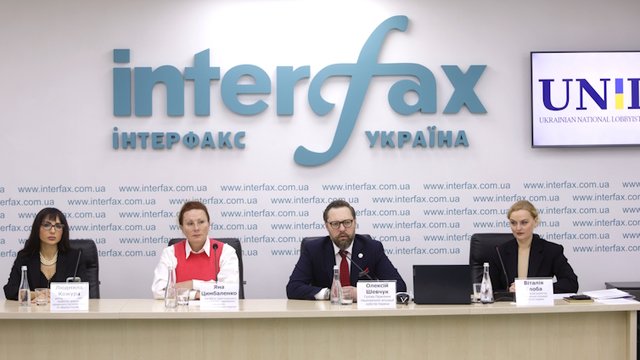Ukrainian National Lobbyists Association introduces the institution of Anti-Corruption Commissioner – Interfax-Ukraine

Report on the Ukrainian National Lobbyists Association’s Initiative to Advance SDG 16
Introduction: Strengthening Institutions and Combating Corruption
The Ukrainian National Lobbyists Association (UNLA) has announced a significant measure to bolster its commitment to the Sustainable Development Goals, particularly SDG 16: Peace, Justice and Strong Institutions. By establishing the institution of an Anti-Corruption Commissioner, the UNLA aims to create a model of transparent and accountable governance within the lobbying profession. This initiative directly supports the achievement of SDG Target 16.5 (Substantially reduce corruption and bribery) and SDG Target 16.6 (Develop effective, accountable and transparent institutions).
The move aligns with European transparency standards and commitments undertaken following the UNLA’s inclusion in the European Parliament Transparency Register, demonstrating a proactive approach to self-regulation and ethical conduct.
Key Strategic Actions for SDG Alignment
The UNLA’s strategy is centered on several key actions designed to institutionalize transparency and integrity:
- Establishment of an Anti-Corruption Commissioner: The appointment of Yana Tsymbalenko, an anti-corruption expert, is intended to ensure the association’s activities are fully transparent and to prevent illicit practices. This directly addresses the need for strong institutional mechanisms to fight corruption.
- Promotion of Transparent Operations: Oleksii Shevchuk, Chairman of the UNLA Board, emphasized the goal is to eliminate “grey schemes” and untaxed payments, ensuring lobbying functions as a legitimate interaction between business and government, thereby contributing to a just and corruption-free society.
- Development of Ethical Frameworks: The association is actively creating educational programs, model contracts for business engagements, and clear guidelines on transparency rules to build capacity and professionalize the sector in line with global best practices.
Call for Inclusive Decision-Making and Partnerships (SDG 16.7 & SDG 17)
A central theme of the UNLA’s announcement is the call for a more collaborative approach to regulation, reflecting SDG Target 16.7 (Ensure responsive, inclusive, participatory and representative decision-making). The association has voiced concerns over the National Agency on Corruption Prevention’s (NACP) recent approval of monitoring procedures for lobbyists, which were reportedly adopted without sufficient consultation.
Core Issues Raised by the UNLA:
- Lack of Public Consultation: The NACP is criticized for developing regulatory documents without engaging the professional community, undermining the principles of participatory governance.
- Risk of State Overreach: The UNLA argues that state bodies should not usurp influence over an independent profession, drawing parallels with the legal and notary professions.
- Alignment with International Democratic Norms: It was highlighted that systematic dialogue between state regulators and professional associations is standard practice in the EU, USA, and Canada. The UNLA advocates for adopting this partnership model (SDG 17) in Ukraine.
The association has declared its intent to appeal to national and European institutions if an open dialogue with the NACP is not established, underscoring the importance of collaborative governance for achieving sustainable development.
Conclusion: Fostering a Culture of Integrity for Sustainable Development
The introduction of an Anti-Corruption Commissioner by the UNLA marks a pivotal step in aligning a key professional sector with Ukraine’s national and international commitments to the 2030 Agenda. By championing transparency, accountability, and multi-stakeholder partnerships, the UNLA is contributing directly to the foundation of peaceful, just, and strong institutions (SDG 16). The association, which represents approximately 40% of all registered lobbyists, has positioned itself as a key partner for the state in developing a regulatory framework that is both effective and democratic, ensuring that lobbying serves as a tool for anti-corruption and sustainable economic progress rather than a vehicle for undue influence.
Analysis of SDGs, Targets, and Indicators
-
Which SDGs are addressed or connected to the issues highlighted in the article?
The primary Sustainable Development Goal (SDG) addressed in the article is:
- SDG 16: Peace, Justice and Strong Institutions. This goal is central to the article’s theme, which revolves around promoting transparency, fighting corruption, and building effective, accountable, and inclusive institutions. The establishment of an Anti-Corruption Commissioner by the Ukrainian National Lobbyists Association (UNLA) and the call for a transparent dialogue with the National Agency on Corruption Prevention (NACP) directly contribute to the objectives of SDG 16. The article focuses on creating a legal and transparent framework for lobbying to prevent it from being a tool for corruption, thereby strengthening justice and institutional integrity.
-
What specific targets under those SDGs can be identified based on the article’s content?
Based on the article, the following specific targets under SDG 16 can be identified:
- Target 16.5: Substantially reduce corruption and bribery in all their forms. The article directly addresses this target through the UNLA’s initiative to introduce an Anti-Corruption Commissioner. The stated goal is to ensure the lobbying profession is “transparent, understandable, and operate exclusively within the legal framework while paying taxes.” The Chairman’s emphasis on “No grey schemes, no grey money, no untaxed payments” is a clear commitment to combating corruption and bribery within the lobbying sector.
- Target 16.6: Develop effective, accountable and transparent institutions at all levels. The UNLA’s actions aim to establish itself as a model of a transparent and accountable professional organization. By aligning with “European transparency approaches” and being included in the “European Parliament Transparency Register,” the association is working to build an effective institution. Furthermore, the criticism of the NACP for adopting procedures “without public consultations” is a call for state bodies to also be more accountable and transparent in their operations.
- Target 16.7: Ensure responsive, inclusive, participatory and representative decision-making at all levels. This target is highlighted by the UNLA’s strong criticism of the NACP’s lack of engagement with the professional community. The association insists that “any reporting mechanisms should be discussed publicly with the professional community” and that decisions cannot be made “bypassing the professional association without expert discussion and transparent procedures.” This demand for “open dialogue” and “public consultations” directly reflects the principles of inclusive and participatory decision-making.
-
Are there any indicators mentioned or implied in the article that can be used to measure progress towards the identified targets?
Yes, the article mentions or implies several indicators that can be used to measure progress:
-
For Target 16.5 (Reduce corruption):
- Establishment of anti-corruption bodies: The formal introduction of the “institution of an Anti-Corruption Commissioner” within the UNLA is a direct, measurable indicator.
- Development of anti-corruption frameworks: The creation of “explanations on transparency rules in lobbyists’ work” and a “model contract with business” are tangible outputs that serve as indicators of progress.
-
For Target 16.6 (Accountable and transparent institutions):
- Adherence to international transparency standards: The UNLA’s inclusion in the “European Parliament Transparency Register” is a specific indicator of its commitment to transparency.
- Proportion of registered entities: The article states that the UNLA unites “about 40% of all lobbyists registered in the transparency register,” which can be used as a baseline indicator to track the formalization and transparency of the profession.
-
For Target 16.7 (Inclusive decision-making):
- Existence of formal consultation mechanisms: The article implies the lack of such a mechanism. An indicator of progress would be the establishment of a “regular dialogue” and “systematic consultations and discussions” between state regulators like the NACP and lobbyist associations, as is the practice in the “EU, USA, and Canada.”
- Number of public consultations on relevant regulations: The UNLA’s call for an “open discussion of the NACP draft document” suggests that tracking the number and quality of such consultations would be a relevant indicator.
-
For Target 16.5 (Reduce corruption):
-
Create a table with three columns titled ‘SDGs, Targets and Indicators” to present the findings from analyzing the article.
SDGs Targets Indicators SDG 16: Peace, Justice and Strong Institutions 16.5: Substantially reduce corruption and bribery in all their forms. - The formal establishment of the institution of an Anti-Corruption Commissioner within the UNLA.
- Development of transparency rules and model contracts for lobbyists.
- Commitment to eliminating “grey schemes” and ensuring all payments are taxed.
SDG 16: Peace, Justice and Strong Institutions 16.6: Develop effective, accountable and transparent institutions at all levels. - Inclusion of the UNLA in the European Parliament Transparency Register.
- The proportion of lobbyists registered in the national transparency register (currently ~40% are UNLA members).
SDG 16: Peace, Justice and Strong Institutions 16.7: Ensure responsive, inclusive, participatory and representative decision-making at all levels. - The number of public consultations held between state bodies (NACP) and professional associations (UNLA) on regulatory acts.
- The establishment of a formal mechanism for “regular dialogue” and “expert discussion” in the policy-making process for the lobbying profession.
Source: en.interfax.com.ua
What is Your Reaction?
 Like
0
Like
0
 Dislike
0
Dislike
0
 Love
0
Love
0
 Funny
0
Funny
0
 Angry
0
Angry
0
 Sad
0
Sad
0
 Wow
0
Wow
0















































































